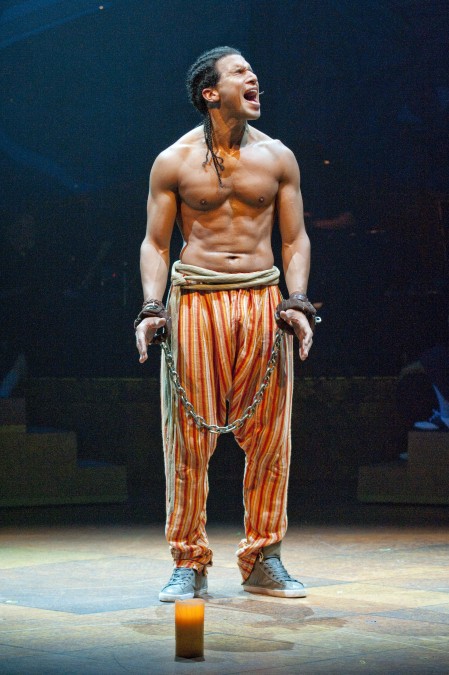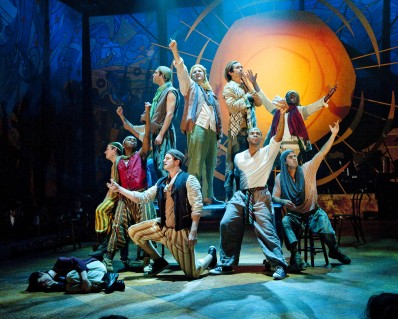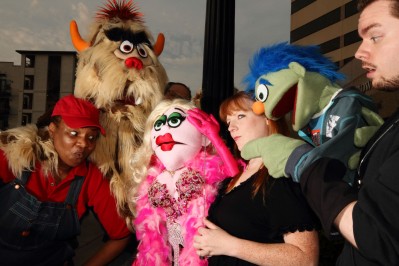
Sydney James Harcourt as a buff Joseph. (Photo courtesy Karen Almond)
The problem with the Webber and Rice musical Joseph and the Amazing Technicolor Dreamcoat has always been its roots as a kids’ Sunday school pageant. It was written to be 20 minutes of Bible education set to music; when they decided to expand it, you could tell where they were padding. The result is tuneful, light enjoyment — 70 minutes of anachronistic songs about the Old Testament. But there’s never been a lot of meat to it; it’s a sing-along show with a Broadway attitude.
Or at least it used to be. Joel Ferrell, who directs and choreographs the version now playing at the Dallas Theater Center, has found a way around Joseph‘s weaknesses. First, the DTC has licensed the extended score, including a mega-mix curtain call medley that reiterates the entire score in digest form.
Second, he’s given a shape to the story it has always been in desperate need of: Instead of the show just being what it is, we now have a reason for it. A group of school kids trudge through a museum with a stern security guard (Liz Mikel). One of the children is fascinated by a copy of the Torah, and the guard takes note. She tell him the story of Joseph and his 11 brothers, and as she does, the stage opens into a Pee-Wee’s playhouse of colorful stagecraft; the kid even imagines himself as the baby brother in the tribe. This conceit does more than bookend the play: It explains to hip weirdness the show has always wrestled with, specifically, songs (and some characters) that seem unexpectedly modern. Why is Pharaoh be portrayed as Elvis? It makes sense if a 21st century child projects his ideas onto a story. And it gives Ferrell the chance to ratchet up the disconnects. The brothers now are skateboarding iPod junkies in baggy shorts and ball caps.
The change does two important things: It raises the energy level of the show, and it allows Ferrell to mount one of the gayest family musicals you’ll ever seen. (Maybe those are the same thing.)
This Joseph is hodgepodge of styles and themes, from the Keith-Haring-Does-Hieroglyphics set to the multicultural cast of brother (including the gayest Asian nomad you’ve ever met). It’s like an episode of Glee without Lea Michele’s pouting.

The brothers ensemble in "Joseph." (Photo courtesy Karen Almond)
It also fixes another problem of the show, which is to finally make Joseph (Sydney James Harcourt) seem sympathetic. In this new idiom, Joseph’s behavior is no more arrogant than a Kanye West awards show appearance (he even passes out head shots). But the time he gets humbled (and then elevated to Deputy Pharaoh of Fabulousness), we’ve come to experience his journey together an identified with him.
It helps that Harcourt, last in Dallas in his award-winning role as the Tin Man in The Wiz, has charisma to spare. He adds a a little touch of star quality (to purloin from another Webber-Rice show) to a musical that usually feels like an ensemble piece. He’s not the only who to sparkle, though. Chamblee Ferguson plays several roles: Joseph’s dad, his first employer Potiphar (as Vegased out Russell Brand bad boy; the Luxor Hotel should place an ad in the program) then as Pharaoh (here, more Jerry Lee than Elvis). And many of the brothers get their moments, especially on “Those Canaan Days” and a few numbers that have the pacing and vigor of a Baptist tent revival.
That’s what really sets this Joseph apart. Familiar as the show it, it’s difficult to reinvent. But that’s just what they’ve done, making it less play than party. Finagle your way to an invite — you’ll be glad you did.

Gary Coleman (Denise Lee), Trekkie Monster and Nicky (James Chandler) all hit on Lucy (Megan Kelly Bates) in "Avenue Q." (Photo courtesy Jeffrey Schmidt)
Over at Theatre 3’s downstairs Theatre Too space, the family musical gets upended even more decisively with Avenue Q. The Tony Award winning sleeper hit pairs human characters alongside puppet versions a la Sesame Street, while teaching adult lessons about life beyond simple grammar and arithmetic.
Avenue Q is a protean musical; as a bit of Gen Xer spoof, it lovingly mocks familiar characters from childhood without getting vicious; as show in a big Broadway house, it has a wickedly subversive but still accessible tone. But when you set it in the 99-seat basement space of Theatre Too, it becomes something else entirely: A true underground show, where puppeteers appear to be sharing dirty jokes in the intimacy of a windowless theater. If you didn’t already know it was a major hit, this Avenue Q would feel like a real find.
The plot could have come straight out of the pilot of Friends: A recent college grad, Princeton (performed and voiced by newcomer Matt Purvis, who exudes an innocent curiosity begging to be corrupted) moved into a low-rent building surrounded by wacky neighbors, including Kate Monster (Megan Kelly Bates), Trekkie Monster (Michael Robinson, who also built the puppets), faded TV star Gary Coleman (Denise Lee) and roomies Nicky (James Chandler) and Rod (Purvis again), a closeted Republican. But three things set it apart: Jeff Whitty’s clever script, the use of puppets (who get away with a lot that would feel wrong being done humans onstage — such as hardcore sex scenes) and the crazy, wonderful songs.
Numbers like “If You Were Gay,” “My Girlfriend (Who Lives in Canada)” (which includes the classic line, Her name is Alberta, she lives in Vancouver / She cooks like my mother and sucks like a Hoover), and “The Internet” approach hipster convos with the sprightly forthrightness of Big Bird learning about flowers. And it makes them all the more charming.
The actors are all terrific; Chandler’s exaggerated “Ernie” voice for Nicky makes him instantly lovable, and Purvis not only voices the puppets perfectly, he manipulates them well, too. Bates is less deft in that department, holding the arm rods awkwardly, but her vocal prowess more than makes up for it.
Director Michael Serrecchia makes the most of a tiny space to create a sense of breadth along Avenue Q. In this version, it’s an address you wouldn’t really mind having.
















I’ve seen a dozen or more productions of Joseph over the years, and some of the “improvements” you attribute to DTC are pretty standard in my experience. They’ve done a high-energy production, and it’s fun. But it’s not ground-breaking, and in fact I think some of the actual changes make little sense in the context of the story. Harcourt, however, is a very good Joseph, one of the best I’ve seen.